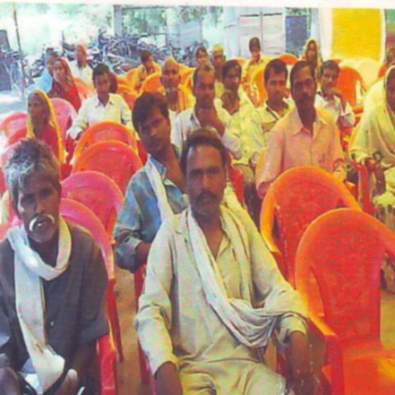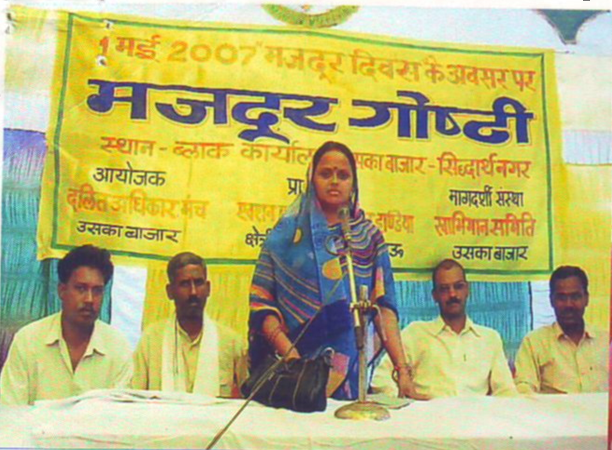Celebrating International Workers’ Day 2007
Swabhiman Samiti has been working to organize marginalized and underserved communities, particularly those from Dalit and backward sections, through community-based organizations like Dalit Adhikar Manch (Dalit Rights Forum). This initiative focuses on uniting disorganized individuals from these communities, developing their leadership skills, and raising awareness about their constitutional rights, as well as their access to government schemes related to education, health, and employment.
Under this initiative, several key activities were carried out to empower the community, including the celebration of International Workers’ Day (May 1st, 2007), a critical event aimed at addressing the issues of labor rights, migrant workers, and minimum wage policies.
- Objective:
The primary objectives of this initiative were:
- To organize Dalit and marginalized communities and foster leadership among their members.
- To raise awareness about the legal and constitutional rights of these communities.
- To provide information about government welfare schemes, especially those related to education, healthcare, and employment.
- To empower the community to take action and advocate for better living conditions, workplace rights, and equality.
- Key Activities and Execution:
2.1 Formation of Dalit Adhikar Manch:
Swabhiman Samiti worked closely with Dalit Adhikar Manch to create a platform where Dalit and marginalized communities could come together. The forum focused on educating these groups about their constitutional rights, including their right to education, healthcare, and participation in government schemes. This collective effort aimed to build a strong, united community that could advocate for social, political, and economic justice.
2.2 International Workers’ Day Celebration:
On May 1st, 2007, Swabhiman Samiti, in collaboration with Dalit Adhikar Manch, organized a Laborers’ Meeting (Mazdoor Goshti) to celebrate International Workers’ Day. This day highlighted the importance of workers’ rights, minimum wages, and the challenges faced by migrant workers.
- The event was marked by a public discussion on several critical issues, including:
- Minimum wage policies and their enforcement.
- Migration of workers to urban areas and the challenges they face in terms of livelihood and social security.
- The lack of local employment opportunities in rural areas and its impact on communities.


2.3 Addressing the Gathering:
The Block Pramukh (Block Head) of Uska Bazar, Smt. Pasi Shanti Devi, was the chief guest for the event. In her speech, she emphasized the significance of unity among laborers. She stressed that only by organizing themselves could workers ensure the protection of their rights and improve their working conditions. Smt. Shanti Devi encouraged the gathering to raise their voices collectively in order to address issues such as unfair wages, lack of opportunities, and exploitative working conditions.
- Impact of the Program:
The Laborers’ Meeting served as a platform to bring attention to various pressing issues faced by marginalized workers and migrant laborers in the region. The key impacts of the event included:
- Empowerment through Information: The event educated workers about their rights and the importance of forming collective groups to demand fair wages and better working conditions.
- Increased Awareness: The discussion about government schemes and labor laws informed the community about opportunities they could access, such as minimum wage guarantees and social security benefits.
- Community Mobilization: The meeting helped in mobilizing local communities and inspired individuals to join the Dalit Adhikar Manch and take collective action for their rights.
- Future Plans and Continuation:
Following the success of the International Workers’ Day celebration, Swabhiman Samiti plans to continue organizing events and activities aimed at further empowering marginalized communities. Future initiatives will include:
- Workshops and Training: Organizing training programs for Dalit and marginalized communities to enhance their leadership skills, understand their legal rights, and improve their participation in social and political processes.
- Advocacy Campaigns: Continuation of advocacy efforts for the implementation of minimum wage policies, healthcare access, and the removal of barriers preventing education and social mobility.
- Expanding the Reach: Extending the activities of the Dalit Adhikar Manch to more villages and communities to ensure a broader reach and stronger impact in the region.
- Conclusion:
Through the establishment of Dalit Adhikar Manch, Swabhiman Samiti is playing a crucial role in organizing marginalized communities and empowering them to secure their rights. The celebration of International Workers’ Day and the Laborers’ Meeting on May 1st, 2007, marked an important milestone in this journey. It was an event that not only raised awareness about labor rights but also inspired unity and collective action among workers to advocate for social justice and economic equality.
Swabhiman Samiti remains committed to this cause and plans to continue its efforts to build a more equitable and just society for the marginalized communities of the region.






